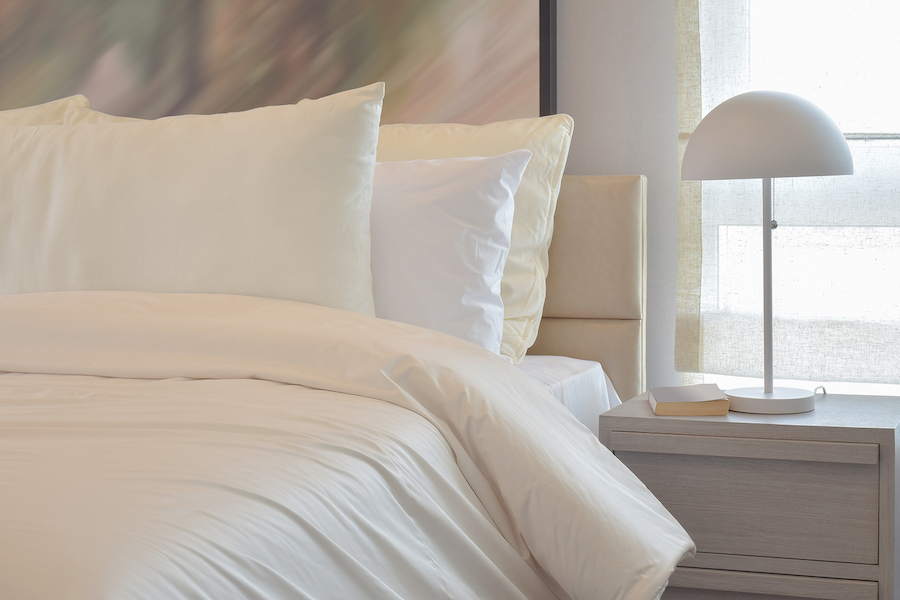Sleep well during menopause
Disrupted sleep is one of the most common symptoms for women during menopause.
From night time hot flushes to restlessness and the feeling of lying wide awake unable to drift back off, getting a good night’s sleep can be a complicated affair.
If you’re struggling with insomnia or sleeplessness, you’re not alone. Hormonal changes, health conditions and stresses can all combine to make the simple act of getting to sleep feel like a distant dream.
Here’s some of our best tips to help you combat sleeplessness and get some rest during menopause.
Use aromatherapy
Aromatherapy bath oils and pillow sprays can help calm you before bed and signal to your brain that it’s time to go sleep. Deep Sleep Pillow Spray from This Works as a huge cult following thanks to its delicate blend of Lavender, Camomile and Vetivert. Spray on your pillow before bed and let the spray work its magic – it’s also a handy tool if you find worrying keeps you up in the middle of the night.
Layer your bed
Night sweats are one of the most common problems for women during menopause. Finding the right sleep temperature can be as simple as layering your bed sheets. Make sure your bed linens are made with natural fibres as these breathe well. Cotton is inexpensive if you’re on a budget. Silk is more expensive but soft and will regulate your temperature well. Linen, too, is a good option, though it wrinkles easily so take this into consideration. Choose a lightweight duvet even in winter – you can layer blankets to make your bed warmer and easily strip back if you get too warm.
Cool your room
The ideal room temperature for sleep is around 18 degrees, so try and keep your room cool. During the cooler months this is as easy as keeping your window open a crack or using a fan.
Try a cooling bedding
If you are finding the bed too warm and the above tricks don’t work, consider getting cooling bedding. Woven from a revolutionary new type of cooling fibre, the fabric used for the Gx Wonder Cooler undersheet and pillowcase has been years in development and is designed specifically to keep you cool at night.
Stay active
Being active during the day can help you sleep better at night. Do your best to get at least 30 minutes of moderate activity – daily if you can – like walking, swimming or Pilates.
Track your sleep
Tracking your sleeping patterns can provide valuable information when you’re living with disrupted sleep. You don’t need fancy equipment – there are many good sleep tracking apps for your smartphone that work by simply being left beside you on the mattress. They will tell you how much sleep you get each night and identify periods of restlessness. You can adjust things that you know aren’t working – like going to bed too early or too late, and also take note of nights when you do get a refreshing sleep.
Forget electronics
The blue light from your tablet, smartphone or computer screen can interfere with your body’s natural sleep cycle. Keep away from the screens at least an hour before bed – calming activities like reading and doing a jigsaw will help you unwind more effectively.
Avoid alcohol and caffeine
Many people turn to a glass of wine or cup of coffee to help them relax and prepare for sleep. And while you might think that glass of red is helping lull you off to sleep, it can actually act as a stimulant and disrupt your sleep cycle. Avoid alcohol at least three hours before bed and caffeine at least six.
Have you developed any strategies for a better night’s sleep during menopause? Share your wisdom in the comments below!
Rachel - Silversurfers Assistant Editor
Latest posts by Rachel - Silversurfers Assistant Editor (see all)
- Chocolate dipped strawberries for Easter - April 13, 2025
- Easter activities for grandchildren - March 31, 2025
- Songs about Mum for Mothering Sunday - March 26, 2025
- The best of Diana Ross - March 25, 2025
- Elton John’s Greatest Hits Playlist - March 24, 2025



















